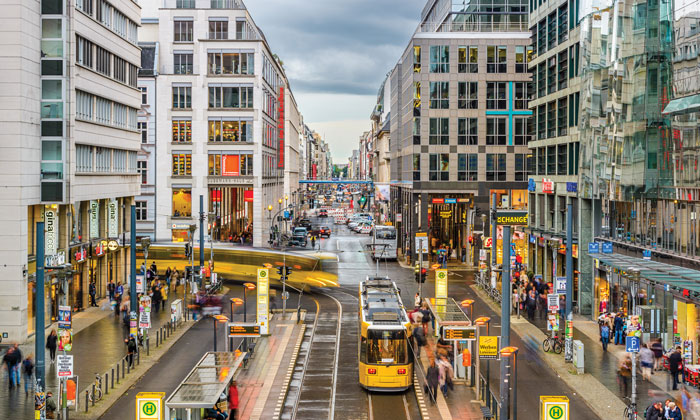Sustainable mobility – made in Germany
- Like
- Digg
- Del
- Tumblr
- VKontakte
- Buffer
- Love This
- Odnoklassniki
- Meneame
- Blogger
- Amazon
- Yahoo Mail
- Gmail
- AOL
- Newsvine
- HackerNews
- Evernote
- MySpace
- Mail.ru
- Viadeo
- Line
- Comments
- Yummly
- SMS
- Viber
- Telegram
- Subscribe
- Skype
- Facebook Messenger
- Kakao
- LiveJournal
- Yammer
- Edgar
- Fintel
- Mix
- Instapaper
- Copy Link
Posted: 19 February 2017 | Sophia Sünder – Manager of Outreach and Communication for the Transport and Urban Development Focus Area at the GPSM | 1 comment
As a network of information exchange and communication, the German Partnership for Sustainable Mobility (GPSM) helps to strengthen international dialogue on sustainable transport. 170 reputable international and German companies active in the sustainable urban transport sector participate in the partnership today and offer their field of expertise – ranging from start-ups, to universities, to established companies such as Siemens and the KfW. In this article for Intelligent Transport, Sophia Sünder – Manager of Outreach and Communication for the Transport and Urban Development Focus Area at the GPSM – elucidates the origins of the association’s history and shares its goals to enhance sustainable mobility for the future.


“If you plan for cars, you will have cars in your city. If you plan for people, you will have people.” There was little doubt that Vicente Torres, representative of GPSM ‘friend’, the PTV Group, hit a nerve when he voiced this statement in Quito, Ecuador in 2016. He made this bold proclamation when the German Partnership for Sustainable Mobility (GPSM) hosted a side event at the UN-HABITAT III conference in autumn 2016, which focused on policies and strategies to harness the power and forces behind urbanisation.
The cities we live in are hubs of culture and economy but, most importantly, they form the backdrop to the lives of its inhabitants and as such play a major role in the living conditions of billions of people. By 2050 two thirds of the world population will live in cities and this will inevitably bring major challenges.
Certainly, growing mobility and increased transport in the newly ever-expanding mega-cities are signs of prosperity and development. But if urban mobility is stuck in traffic – so is development. In Cairo, traffic jams already cost US$ 8 billion annually, which equates to 4% of Egypt’s total GDP. 85% of the population commutes more than one hour to work every single day. Tremendously polluted cities like Beijing or Dhaka already serve to illustrate the urgent need to transition to low-carbon and clean urban mobility solutions.
The important question to address is therefore: What should be the focus of our efforts in addressing the challenges evoked by urbanisation in transport – cars or people?
The route towards a German Partnership for Sustainable Mobility
The German objective to reduce greenhouse gas emissions (GHG) by 40% by 2020 and up to 95% by 2050 (compared to levels from 1990) is an ambitious one. Transport is among the top emitters of GHG and especially urban transport, which accounts for nearly half of the transport-related global GHG today. With this in mind the German Federal Ministry for Economic Cooperation and Development (BMZ) and the Federal Ministry for the Environment, Nature Conservation, Building and Nuclear Safety (BMUB) initiated the German Partnership for Sustainable Mobility (GPSM). It provides a strong illustration of Germany’s aspiration to be a trailblazer in progressive climate policy. It is also a follow-up to the Rio+20 process, to lead other international forums on sustainable development and in European integration.
Due to the scarcity of energy resources, the high density of people and enterprises, as well as the compactness of the country, Germany opted early on for energy-efficient, integrated and smart solutions in the transport sector. It is known for its road infrastructure, extensive railway system, inclusive public transport and bike-friendly environment. The German integrated networks of long-distance and regional trains, as well as trams and buses form the backbone of mobility in German cities. An average of 30 million passengers use public transport every day, and the numbers are growing. The total number of passengers increased by 9.6% between 2004 and 2013 to 10.9 billion public transport riders per year – almost one billion additional yearly riders. This is particularly impressive considering the fact that the German popula tion declined from 82.5 to 81.1 million during the same period.
Successes in Germany are based on solid knowledge, strategies and innovations such as software experts on piloting trains; planners for bike-sharing models; and developers of concrete that is resilient to climate change. With such innovation, Germany has become one of the global frontrunners in environment-friendly politics and technologies and offers many farreaching, sustainable solutions in mobility and logistics services. Why not, therefore, use German expertise to enhance mobility world – wide, especially in emerging nations?
Academia, businesses, civil society and associations have all gathered invaluable experiences and skills in framing transport transforma tions. Furthermore, each of them, be it from municipal administrations, public transport operators, or planning and design offices, possess a rich and diversified body of knowledge reflecting not only their success stories, but also lessons learned from setbacks.
For this reason expert exchange is a fundamental basis of the GPSM’s activities. GPSM members network internally and externally: Participation in a vibrant community gives ‘friends’ the opportunity to meet decision-makers in the international arena. In addition, integrity and respect are core principles of the partnership’s values and mission. The transferability of concepts and ideas hinges upon respecting local and regional diversity, skillsets and experiences, as well as acknowledging their unique constraints.
Sustainable transport as a solution for modern challenges
Sustainable transport solutions in cities are crucial, not only as a means to fight the peril of climate change, but in order to better serve the mobility demands of our growing numbers of commuters, and maintain healthy liveable environments.
Possibilities are manifold: public transport systems, park and ride networks, bus rapid transit networks or car- and bike-sharing systems, can all transform cities into places for healthy living, research and innovation. Green logistics with effective fleet management, route planning, or intermodal freight transport help to improve the efficiency of production and trade by reducing the negative footprint of transport. Furthermore, research backs up these benefits: promoting public transport and non-motorised transport could not only cut emissions by 40% by 2050, but also help save US$ 100 trillion worldwide between now and 2050.
Fortunately in recent years the vision of urban transport planning has already started to shift. Solutions range from road capacity-oriented provision of infrastructure to providing more energy efficient and affordable access to mobility. Yet promising sustainable transport approaches are still developing at a very slow pace and remain a small part of a malfunctioning puzzle, despite their potential to be the gamechanger in transport worldwide. Sustainable transport systems are far from reaching complete national or international implementation. Or are they?
In Germany, as well as worldwide, the mobility scene seems divided: Are innovative schemes such as car- or bike-sharing mere gapfillers to patch up a malfunctioning public transport system? Can they help to reduce private car ownership in urban areas? Should Uber and allygator shuttles be seen as a competitor or a meaningful addition to public transport systems? On the one hand, there are many who question whether innovative mobility solutions are overrated and technologically idealised, believing that they often have a blind spot for the real needs of local and national decision-makers. On the other hand, it can be said that too little is done to foster innovation and digitalisation. The crux of the issue appears to be that there is a tendency for positions to be depicted as mutually exclusive and opposing each other. The discourse is too often divided, rather than fruitful.
As new mobility providers have entered the transport market, recent years have witnessed tremendous conflict potential: Start-ups against city officials; city officials against big companies; and big companies against start-ups. Recall the global controversy surrounding the concept of Uber, or the years of discussion about dissolving the monopoly of the German state company Deutsche Bahn in favour of opening the market for private long-distance bus companies.
It could be this lack of reciprocity that is the reason the transport sector is finding itself on an unpromising path: A path on which the development of reliable urban transport services are already failing to keep pace with dynamic economic and demographic trends, particularly in emerging economies and developing countries. However, the indispensable local and global shift in transport policy can only be successful if everyone participates and sustainable transport solutions are systematically pursued in a comprehensive manner.
And herein lies the GPSM’s objective: Attempting to remove the walls of division that impede the creation of inclusive, sustainable, innovative and simply better mobility solutions. By gathering German knowledge and expertise, the GPSM contributes to the international dialogue on smart transportation and to sustainable development worldwide.
When the GPSM invited 60 experts and city officials from Berlin, Freiburg, Bremen and Munich to an expert forum in the GIZ Representation in Berlin it was under the headline ‘Connected, mobile and sustainable – the digital city’. It successfully united various mobility professionals, bringing together different perceptions and perspectives with a solution-oriented goal.
However, this time – amid the inevitable controversial debate – a different focus emerged: It became clear how important it is to not only have an intensive, fruitful dialogue between the interdisciplinary actors, but that all of them strive to focus on people, rather than cars.
The GPSM serves as a guide, a platform and a melting pot that encompasses the entire gamut of sustainable mobility and sustainable logistics, offering its partners the opportunity to meet up, discuss, and generate ideas with politicians and business people from all over the world. Thus, at its core, the GPSM is ‘just’ a network, inviting every company in the sustainable urban transport sector to become a ‘friend’. But in its heart it is a lot more than that.
Reference
Biography


Sophia Sünder has previously worked for the German television channel ZDF, the United Nations, the German Embassy in Bulgaria and the German State Ministry for Infrastructure Rhineland-Palatinate. She focuses on communications, public relations, project management and cooperation with international partners and holds a master’s degree in Political Science from King’s College London.
Related topics
Air Quality, Business Models, Sustainable Urban Transport, Transport Governance & Policy
Issue
Issue 1 2017
Related cities
Germany
Related organisations
GPSM
Related people
Sophia Sünder









It’s important to promote sustainable mobility, especially now that pollution has reached very high levels. Car emissions are poisoning our cities and the air that we breath isn’t clean at all. Partnership like the one described above are important for urban transport: Germany is doing it right.